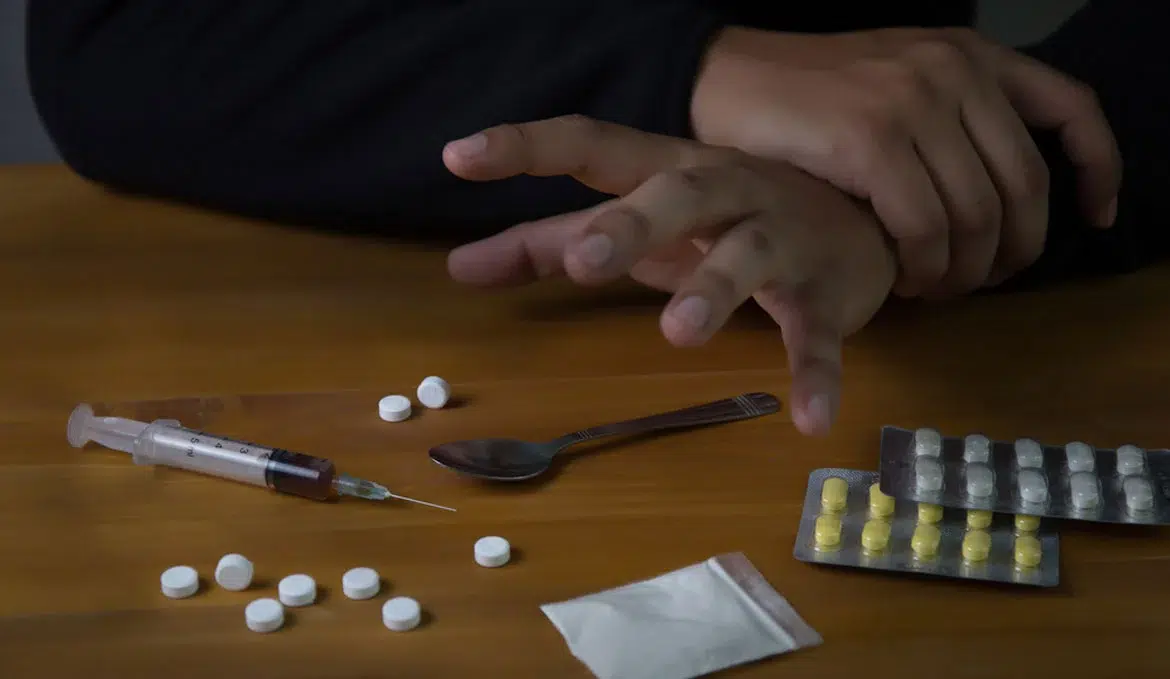Understanding Heroin Addiction
Table of Contents
Heroin is an opioid drug manufactured from morphine, a naturally occurring substance extracted from the seed pod of the opium poppy plant grown in Colombia, Mexico, and parts of Southeast and Southwest Asia. This drug is often sold as a white or brown powder but comes in various forms, including a black sticky substance known as black tar heroin. Knowing the symptoms of heroin use can help you find the right forms of help for a loved one.
Heroin is a fast-acting and highly addictive drug, making it among the most abused opioid in the United States. According to the National Center for Drug Abuse Statistics (NCDAS), approximately 6.25 million Americans have used heroin in their lifetime. The agency also reports over 900,000 people to use heroin annually.
Using heroin induces a rush of euphoria and overall well-being. However, after a few hours, the high wears off, leaving users eager to use more of the drug to get the same feeling. This vicious cycle often leads to heroin dependence and addiction.
Read on to learn more about the effects and symptoms of heroin use, and how to get a loved one effective treatment at Emerald Isle Health & Recovery!
Immediate Placement for Heroin Addiction – Call Now!
How Do People Use Heroin?
Although most heroin users inject heroin straight into their veins, other common routes of administration for heroin are snorting or smoking. IV drug administration is the riskiest way to use this drug because of the potential for overdose or exposure to blood-borne pathogens.
Regardless of the route of administration, Heroin reaches the brain rapidly, triggering physical dependence and addiction. Even a single dose of heroin can make it difficult to stop using.
After using heroin, a person quickly experiences a surge of euphoria. They then feel like the world has slowed down, leading to a slow thought process and reaction time. Some users say that this feeling makes one feel like they’re in a dream.
Heroin reduces health and breathing rates. It also prevents your body from receiving pain messages. Overdosing can cause you to cease breathing, which can be life-threatening.
Most people abuse heroin as a coping mechanism to alleviate mental illnesses such as anxiety and other stress factors. Regular drug users often suffer from co-occurring disorders and mental illnesses like depression, post-traumatic stress disorder (PTSD), attention deficit hyperactivity disorder (ADHD), or bipolar disorder.
Why Is Heroin Use Popular?
The increasing misuse of prescription pain relievers like oxycodone and hydrocodone, which are also derived from the poppy plant and are chemically linked to heroin, has contributed to the epidemic of heroin usage.
Those who abuse or develop a dependency on these substances may seek substitutes that provide a more potent and less expensive high. Heroin meets this criterion, but is riskier than prescription opioid drugs.
Opioid-related overdose deaths have increased considerably recently, with about 14,000 people dying from heroin overdose annually. Heroin is sometimes laced with other substances, including the strong opioid fentanyl, which increases its potency and can cause an overdose.
What are the Symptoms of Heroin Use & Abuse?
People who abuse heroin may exhibit a wide range of signs and symptoms. Some of the unpleasant symptoms of heroin usage may be apparent immediately after use. They include:
- Sudden behavioral changes
- A lack of concentration or interest
- Experiencing an abrupt lapse into sleep
- Constricted pupils
- Sudden hyper-alertness
- Breathing difficulties
The signs and symptoms of heroin use might worsen as the disease progresses into addiction and dependence. Examples of unpleasant withdrawal symptoms include:
Physical symptoms:
- Warm flushes on the skin
- Feeling heavy in the extremities
- Nausea
- Dry mouth
- Constipation
- Persistent flu-like symptoms like a runny nose
- Weight loss
- Needle marks on the arms or legs
- Change in eating patterns
Behavioral symptoms:
- Rejecting family members and one’s loved ones out of guilt or distaste for one’s shortcomings
- Conflict and disagreement with friends and family
- Stealing from loved ones or engaging in unlawful activities
- Wearing long sleeves even in hot weather to hide track marks at injection sites
- Uncontrollable drug seeking behaviors
- Deceptive behavior
- Acts of hostility
- Lack of coordination
- Disinterest in previous hobbies
- Extreme itchiness
24 Hour Heroin Addiction Hotline
Psychological signs and symptoms:
- Lack of responsibility
- Irritability
- Hostility
- Depression
- Anxiety
- Disruptions in sleep, such as insomnia
- Restlessness
- Sudden change in how one prioritizes life
Other common symptoms of heroin addiction include hallucinations, disorientation, and paranoia.
Causes and Risk Factors Associated with Heroin Addiction
Although the precise reason why some people become addicted to heroin is still unknown, research shows that it is due to several distinct reasons. Below are some of the most commonly cited causes and risk factors involved in the development of heroin abuse disorder:
- Biological and genetic factors: Substance misuse tends to run in families. Addiction is more prevalent in people with a family history of multiple individuals battling with substance abuse.
- Psychological risk factors: People battling heroin addiction may deal with undiagnosed mental health conditions. Drug use could represent an effort to treat one’s health problems.
- Environmental causes and risk factors: Most heroin users grew up around drug use, reinforcing the social norm that taking drugs is okay. People exposed to drug addiction at a young age learn that substance abuse is a socially acceptable method to cope with difficulties in life.
- Brain chemistry: Changes in brain structure and chemical balance brought on by heroin addiction can result in intense, uncontrollable cravings for drug use. Heroin’s euphoric effects make users feel good about themselves, encouraging them to keep using it.
The Effects of Long Term Heroin Abuse
Prolonged heroin abuse can leave you vulnerable to various negative consequences in different areas of your life. Some of the adverse effects of heroin abuse include the following:
- Issues in academic life, such as dropped grades, failure, and disciplinary measures
- Occupational failures such as job loss and chronic unemployment
- Homelessness
- Financial issues
- Family problems
- Relationship issues
- Legal issues that can lead to incarceration
- Self-harming behaviors
The use of heroin for a prolonged period can lead to a decline in mental and physical health for heroin users. Some examples of the adverse psychological and physical effects of heroin abuse include suicidal thoughts, contracting viruses like HIV, ad severe organ damage.
Heroin Withdrawal Symptoms
According to the Drug Enforcement Administration (DEA), Heroin is a Schedule I substance under the Controlled Substances Act. This means that the illegal drug is highly addictive and causes physical diseases, impairments, and general disruptions in social, occupational, and academic life.
Those who partake in heroin use frequently may develop a tolerance to the drug’s effects, which leads to increasing doses required to maintain the same effect. With time, your body will need more and more of the substance, and if you try to stop using it, you may experience heroin withdrawal signs. Common withdrawal symptoms include;
- Intense cravings for the drug
- Jitters
- Chills
- Dehydration
- Vomiting
- Diarrhea
- Runny nose
- Watery eyes
- Muscle and bone aches
- Insomnia
- Sweaty palms
- Hyper-perspiration
- Incessant kicking of the legs
Large doses of heroin can lead to overdose and death.
The Risks of Heroin Overdose
When heroin is taken in extremely high doses, the body may be unable to metabolize the drug, leading to an overdose. Overdosing on heroin can be fatal, and one should receive emergency medical care as soon as possible to save life. Signs and symptoms that one may have overdosed on heroin may include:
- Breathing difficulties
- Drowsiness
- Disorientation
- Bluish lips or extremities
- Discolored tongue
- Dry mouth
- Muscle spasms
- Small pupils
- Weak pulse
- Heart attack
- Seizures
- Stroke
- Coma
24 Hour Addiction Helpline – Call Now!
Heroin Addiction Treatment
Our medical team at Emerald Isle Health and Recovery can help develop a customized treatment plan that meets your unique needs. Heroin addiction treatment usually involves medication and behavioral therapy. Professionals usually consider medication-assisted treatment (MAT) for heroin addiction as the best option to care for people battling heroin addiction.
Weaning off heroin with the help of medication can ease withdrawal and decrease cravings. Like heroin, buprenorphine and methadone act by attaching to opioid receptors in the brain. Compared to heroin, these medications pose fewer health risks and last significantly longer. The opioid receptors are blocked by naltrexone, rendering drugs like heroin ineffective. Because of this, using them is less enjoyable.
Through cognitive behavioral therapy (CBT), clients at our facility learn how to better monitor their thoughts and actions concerning drug abuse. It teaches people in recovery techniques for dealing with stress and other emotional and mental obstacles to encourage abstinence from drugs.
If you or a loved one is battling heroin addiction and withdrawal symptoms, contact us now for a confidential discussion of treatment options!



